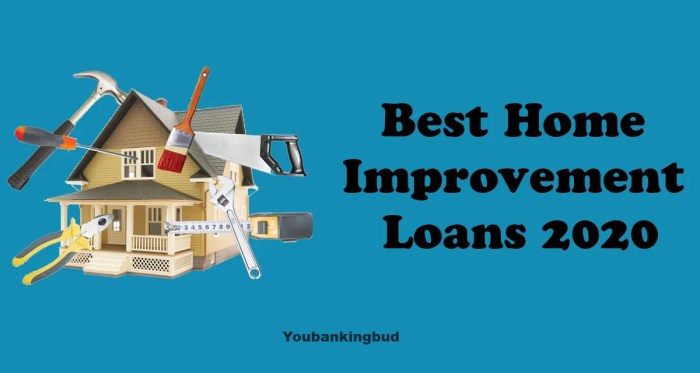Get ready to dive into the world of home improvement loans! This guide is your go-to source for everything you need to know about finding the best loans to spruce up your space. So, buckle up and let’s explore the ins and outs of financing your dream home upgrades.
In this comprehensive guide, we’ll break down the different types of loans available, factors to consider when choosing a loan, pros and cons of home improvement loans, and tips for securing the best loan terms. By the end, you’ll be equipped with the knowledge to make informed decisions about your home improvement financing.
Types of Home Improvement Loans

When it comes to financing your home improvement projects, there are a few different types of loans to consider. Each type has its own eligibility criteria and benefits, so it’s important to understand the differences before making a decision.
Personal Loans
Personal loans are unsecured loans that can be used for a variety of purposes, including home renovations. These loans typically have fixed interest rates and repayment terms. To qualify for a personal loan, you’ll need a good credit score and a stable income.
Home Equity Loans
Home equity loans allow homeowners to borrow against the equity in their homes. This type of loan typically has a fixed interest rate and a fixed repayment term. To qualify for a home equity loan, you’ll need to have a certain amount of equity in your home and a good credit score.
Home Equity Lines of Credit (HELOC)
HELOCs are similar to home equity loans, but they function more like a credit card. You can borrow money as needed, up to a certain limit, and only pay interest on the amount you use. To qualify for a HELOC, you’ll need equity in your home and a good credit score.
Factors to Consider When Choosing a Loan
When selecting the best loan for home improvement, there are several important factors to consider. From interest rates to repayment terms, understanding these aspects can help you make an informed decision.
Interest Rates
Interest rates play a crucial role in determining the overall cost of your loan. Lower interest rates can save you money in the long run, while higher rates can increase the total amount you pay back. It’s essential to compare rates from different lenders to find the most competitive option.
Repayment Terms
Repayment terms refer to the length of time you have to pay back the loan. Longer repayment terms may result in lower monthly payments but can also mean paying more in interest over time. Shorter terms typically come with higher monthly payments but can save you money on interest.
Fees Associated with Home Improvement Loans
In addition to interest rates, it’s crucial to consider any fees associated with home improvement loans. These fees can include origination fees, prepayment penalties, and closing costs. Make sure to factor in these additional expenses when comparing loan options.
Impact of Credit Score
Your credit score plays a significant role in determining your loan options and the interest rates you qualify for. A higher credit score can lead to lower interest rates and more favorable loan terms, while a lower credit score may result in higher rates or difficulty securing a loan. It’s important to check your credit score before applying for a loan and work on improving it if necessary.
Pros and Cons of Home Improvement Loans
When considering a home improvement project, taking out a loan can be a viable option to finance the renovations. However, it is essential to weigh the advantages and disadvantages before making a decision.
Advantages of Home Improvement Loans
- Ability to fund large projects: Home improvement loans provide the necessary funds to undertake major renovations that may not be feasible with personal savings.
- Fixed interest rates: Many home improvement loans offer fixed interest rates, providing predictability in monthly payments and protection against rising interest rates.
- Potential increase in property value: Investing in home improvements can potentially increase the value of your property, making it a worthwhile financial decision in the long run.
- Tax benefits: In some cases, the interest paid on home improvement loans may be tax-deductible, providing additional financial benefits.
Drawbacks of Home Improvement Loans
- Accrued debt: Taking out a loan means accumulating debt that needs to be repaid, which can add financial strain if not managed properly.
- Risk of default: Failure to make timely payments on a home improvement loan can lead to penalties, damaged credit scores, and potential foreclosure on the property.
- Interest costs: While fixed interest rates offer predictability, the overall cost of borrowing money for home improvements can be higher due to interest charges over time.
- Limited financing options: Home improvement loans may have restrictions on the types of projects that can be funded, limiting flexibility compared to other financing methods.
Tips for Getting the Best Home Improvement Loan
When it comes to securing the best home improvement loan for your project, there are several strategies you can implement to ensure you get the most favorable terms and rates. From improving your credit score to negotiating with lenders, here are some tips to help you get the best deal.
Improve Your Credit Score
If you’re planning to apply for a home improvement loan, it’s essential to work on improving your credit score beforehand. A higher credit score can help you qualify for better loan terms and lower interest rates. Make sure to pay your bills on time, reduce your debt-to-income ratio, and check your credit report for any errors that need to be corrected.
Negotiate with Lenders
Don’t be afraid to negotiate with lenders to get better loan offers. Shop around and compare rates from different lenders to see who can offer you the best deal. Once you have a few offers on the table, use them as leverage to negotiate with your preferred lender. Ask for lower interest rates, reduced fees, or flexible repayment terms to make sure you’re getting the most out of your home improvement loan.






